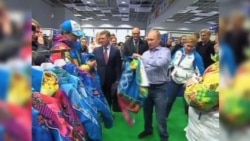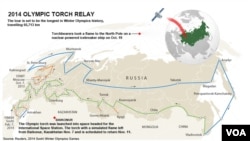SOCHI —
When the Sochi Olympics open on Friday, they will be the most expensive Olympics games in history.
The $50 billion cost is four times Putin's original estimate back in 2007, when Russia was awarded the games.
Elena Panfilova, executive director of Transparency International Russia, said corruption and overspending are souring many Russians on the Olympics.
“Corruption got out of hand,” said Panfilova, whose group has studied the construction tenders.
“Even those who should not be taking money, should not be stealing, should not be overpricing, especially social services. Even those who were told to stop certain practices, they kept going. And in this situation, it is difficult to feel the mood of the Olympics,” she said.
Last month, Gian-Franco Kasper, a Swiss member of the International Olympic Committee, estimated that Russian authorities and friends of the government had embezzled about one-third of the $50 billion spent on the Olympics. Last week, Alexei Navalny, a Russian opposition leader, issued a report saying that a series of ‘no compete’ construction contracts issued to friends of President Putin allowed them to siphon off $15 billion in state funds.
Pressured by allegations about corruption, President Putin told foreign reporters on January 19 that no proof exists and that “no one has provided us with such information so far.”
"It was not supposed to be like this," said Mark Galeotti, a Russia analyst and professor of global affairs at New York University.
“When Russia made its bid for the Sochi Olympics, everything was going Putin's way,” Galeotti recalled in an interview in Moscow.
“The economy was buoyant, politically, he was unassailable and therefore Sochi was going to be a grand coming-up party for the new Russia. It was to show the world Russia was rich enough to spend the money on such an event, efficient and well-organized enough,” said Galeotti.
However, economic growth dropped to 1.3 percent last year, a fraction of the five percent Putin promised when he ran for reelection two years ago. Now, half of Russians tell the Levada polling company they do not want him to run for re-election.
Criticized as authoritarian, President Putin freed jailed political rival Mikhail Khodorkovsky in December.
After spending 10 years in jail, Khodorkovsky immediately talked to reporters about Putin’s political future.
"Our law allows President Putin to remain in power, of course if people vote for him, for the next 10 years,” he said in Berlin. “He was recently asked, and I read about it, whether he believes he should be president for life. He clearly answered 'no'. I hope he will not change his point of view,” said Khodorkovsky.
Khodorkovsky’s release did not change Western views of Putin. Foreign ticket sales for the Olympics have been slow, as would-be buyers cite security worries, high travel costs, and Russia’s anti-gay laws.
Last week, leaders of the European Union cut a two-day meeting with Putin down to three hours. The leaders of the United States, France and Britain will not fly to Sochi for the Olympics.
However, with an extravagant Olympic opening ceremony planned, President Putin hopes the negatives will be forgotten when the fireworks start on Friday night.
The $50 billion cost is four times Putin's original estimate back in 2007, when Russia was awarded the games.
Elena Panfilova, executive director of Transparency International Russia, said corruption and overspending are souring many Russians on the Olympics.
“Corruption got out of hand,” said Panfilova, whose group has studied the construction tenders.
“Even those who should not be taking money, should not be stealing, should not be overpricing, especially social services. Even those who were told to stop certain practices, they kept going. And in this situation, it is difficult to feel the mood of the Olympics,” she said.
Last month, Gian-Franco Kasper, a Swiss member of the International Olympic Committee, estimated that Russian authorities and friends of the government had embezzled about one-third of the $50 billion spent on the Olympics. Last week, Alexei Navalny, a Russian opposition leader, issued a report saying that a series of ‘no compete’ construction contracts issued to friends of President Putin allowed them to siphon off $15 billion in state funds.
Pressured by allegations about corruption, President Putin told foreign reporters on January 19 that no proof exists and that “no one has provided us with such information so far.”
"It was not supposed to be like this," said Mark Galeotti, a Russia analyst and professor of global affairs at New York University.
“When Russia made its bid for the Sochi Olympics, everything was going Putin's way,” Galeotti recalled in an interview in Moscow.
“The economy was buoyant, politically, he was unassailable and therefore Sochi was going to be a grand coming-up party for the new Russia. It was to show the world Russia was rich enough to spend the money on such an event, efficient and well-organized enough,” said Galeotti.
However, economic growth dropped to 1.3 percent last year, a fraction of the five percent Putin promised when he ran for reelection two years ago. Now, half of Russians tell the Levada polling company they do not want him to run for re-election.
Criticized as authoritarian, President Putin freed jailed political rival Mikhail Khodorkovsky in December.
After spending 10 years in jail, Khodorkovsky immediately talked to reporters about Putin’s political future.
"Our law allows President Putin to remain in power, of course if people vote for him, for the next 10 years,” he said in Berlin. “He was recently asked, and I read about it, whether he believes he should be president for life. He clearly answered 'no'. I hope he will not change his point of view,” said Khodorkovsky.
Khodorkovsky’s release did not change Western views of Putin. Foreign ticket sales for the Olympics have been slow, as would-be buyers cite security worries, high travel costs, and Russia’s anti-gay laws.
Last week, leaders of the European Union cut a two-day meeting with Putin down to three hours. The leaders of the United States, France and Britain will not fly to Sochi for the Olympics.
However, with an extravagant Olympic opening ceremony planned, President Putin hopes the negatives will be forgotten when the fireworks start on Friday night.






